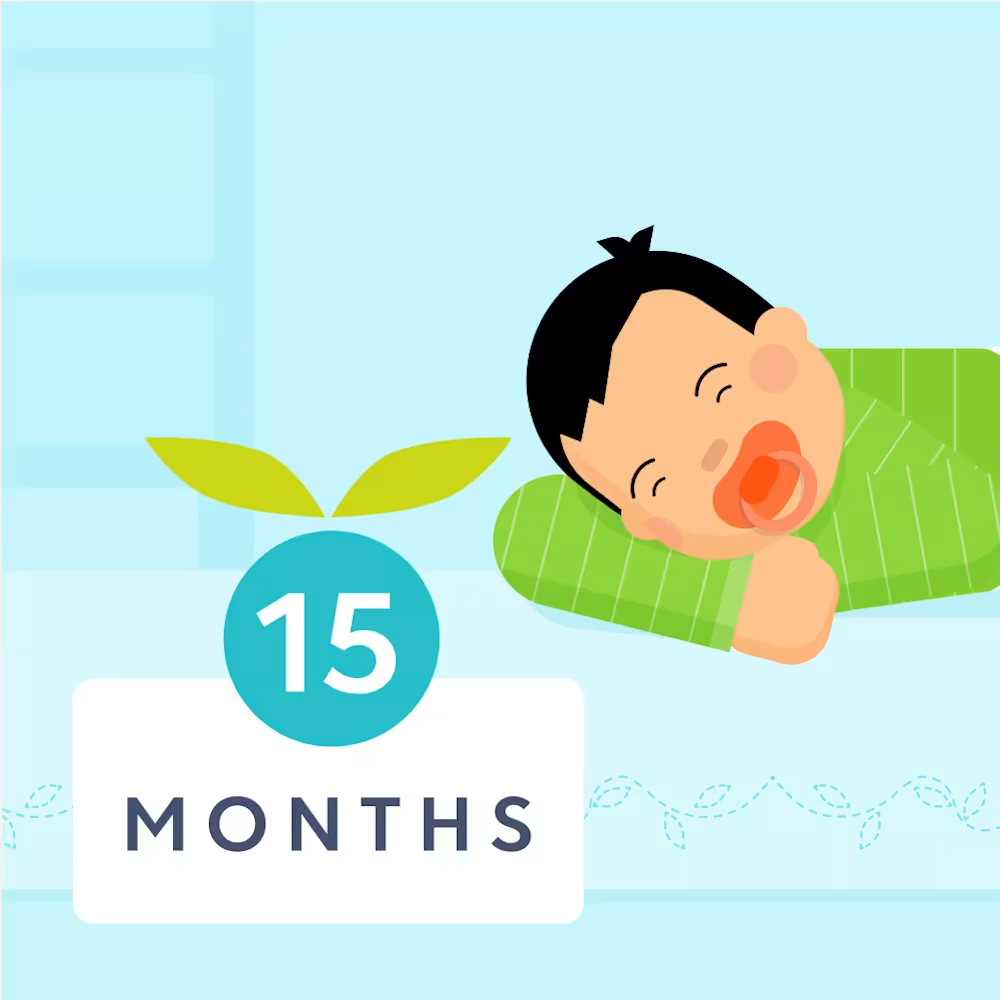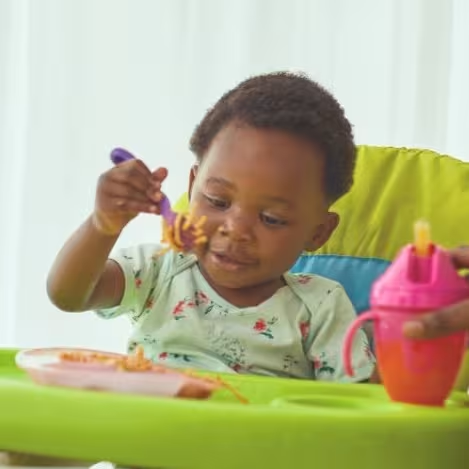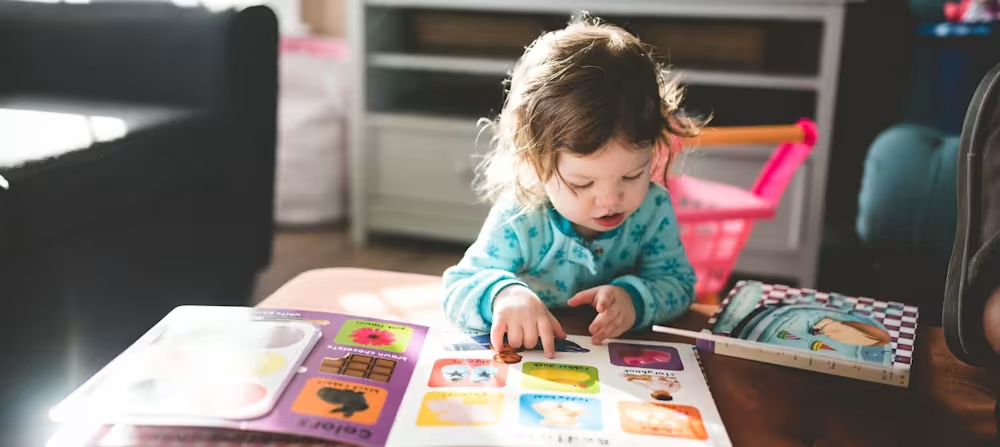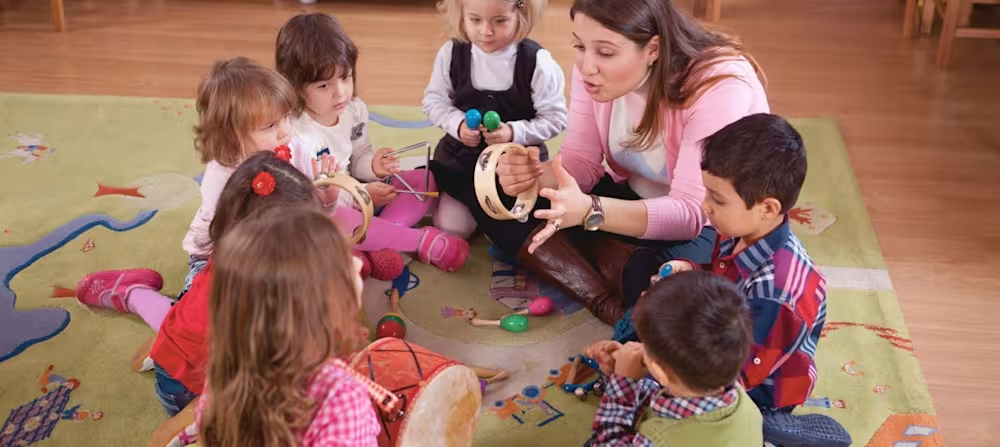15 month old toddler milestones: Development, growth, speech, language
Updated Dec 29, 2025
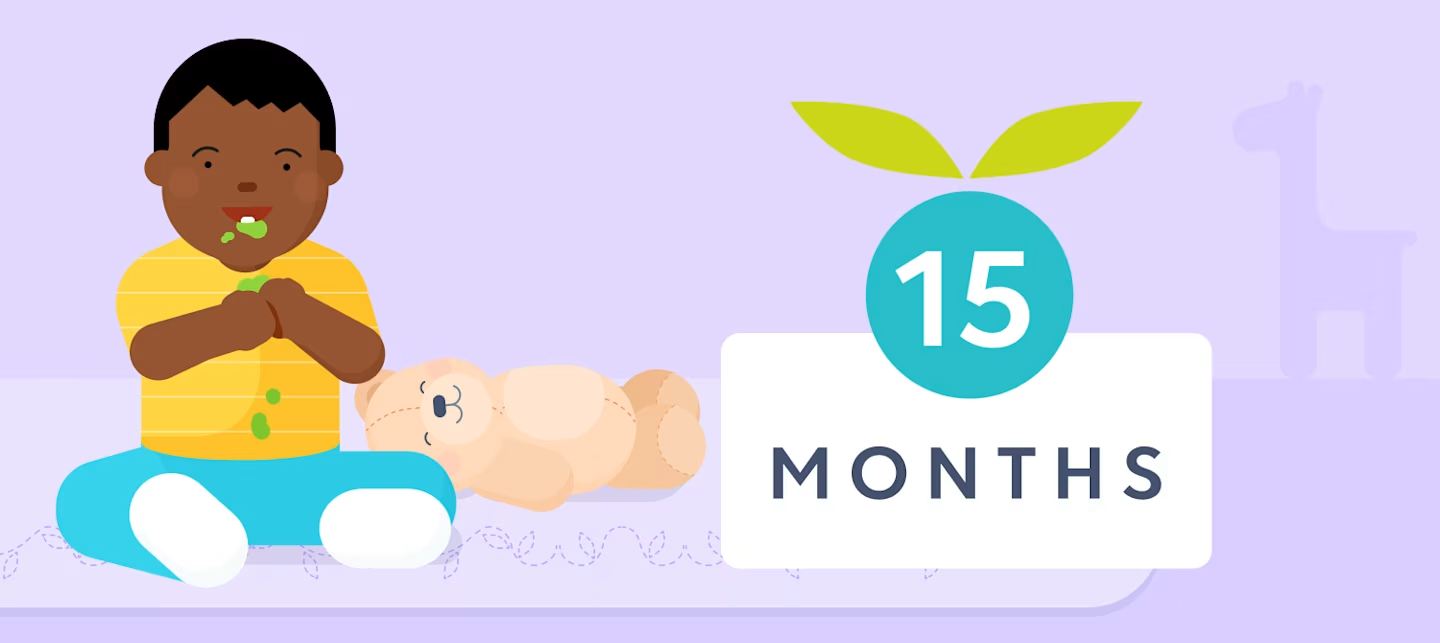
Your 15 month old is entering the toddler years, which is an exciting time filled with many important milestones. At the same time, it’s understandable for parents to feel a bit confused. How does a 15 month old toddler act and think differently than an infant? Should they be talking? Are there new safety upgrades around the home to consider?
In this article, we’ll cover the most important 15 month milestones to watch for as your baby approaches this age, including speech milestones and development (language development, physical development, and emotional development!).
We’ll also give you a handy 15 month development checklist, and share tips to support your baby’s development.
15 month old baby milestones at a glance
At a year and 3 months, your toddler is in a period of rapid development. Doctors consider the 15 month mark a significant milestone in your child’s life [, ]. Here’s why:
Development:
At 15 months, most babies are starting to take a few steps on their own – walking (or maybe wobbling at this point) out of their baby years and into toddlerhood.
15 month old toddlers may say their first words – including the basics like “mama,” “dada,” and other simple words for things around them (like maybe your family pet’s name). They may show you more affection and love at the 15 month mark, though it’s common for them to experience some tantrums and separation anxiety too.
Sleep:
At , we recommend trying for around 13 hours of total sleep. This looks like about 11 hours every night and 1 - 2 naps during the day. Most babies this age need about 4 - 5 hours of awake time before bed to be sufficiently tired. If your toddler is taking 2 naps and sleeping less than 10 hours at night, that’s a good indication that your little one is ready to transition to a 1-nap schedule.
Keep in mind that sleep needs are unique to each child, and the range of what's normal and healthy can vary. Although general guidelines offer a baseline for recommended sleep hours, observing your child's mood and energy is equally vital. These observations can help to determine their specific sleep requirements.
Feeding:
As solid foods become the primary source of nutrition, most toddlers grow more confident with their eating skills. At 15 months, it’s recommended to offer 3 meals and 2 snacks a day. According to the American Academy of Pediatrics, toddlers aged 1 - 3 need around 40 calories per day for every inch of height. [] Milk (whether animal, plant-based, or breast milk) can be used as a beverage rather than a meal, as solids likely will take up a majority of their diet.
Physical growth:
Your child is still growing rapidly, but growth does start to slow around the 2-year mark. You may notice a decrease in your little one's interest in food but it’s still important to offer three meals and a few snacks a day. Even when they aren’t ingesting food, they are gaining valuable skills by sitting at the table and interacting with a variety of foods. [] If you’re concerned about their growth, be sure to talk to your child’s healthcare provider.
15 month developmental milestones
Physical development at 15 months
One of the biggest 15 month old milestones is that your baby is now moving around a lot more independently.
Gross motor milestones
Walking: At 15 months, most babies are in the midst of transitioning into the toddler stage. This means, in big part, that they’re now “toddling” around (pun intended) to take their first steps. This newfound independence often means that your child is now getting into, well, everything. They’re eager to test their legs and may be busy running, climbing, and exploring. As a parent, it’s not unusual to feel a little more tired at this age! It’s a good time to consider if your home needs childproof updates, such as gating stairs or locking cabinets.
Fine motor milestones
15 month olds are typically able to carry things, stack things, and use two fingers to try to feed themselves. This is also when you might start finding items in different places than you left them!
Speech and language development
Some of the most delightful 15 month milestones are the changes in how your child communicates. As you read over the following, don’t be too concerned if your 15 month old’s language skills aren’t yet at this level. However, do talk to your doctor if you're concerned about how your little one is communicating [].
Verbal and language skills: Most 15 month old babies can say a few very basic words, including names for caregivers (like “mama” or “dada”) and a few other words for things they use or see all the time. They might know simple words like “ball,” “doggy,” or “no”.
Don’t be alarmed if this doesn’t quite sound like a real word yet (“ball” may sound more like “bah,” for example).
Understanding commands: On top of budding language skills, 15 month olds are also learning about other ways to communicate. They’re more able to understand simple verbal commands, even if they can’t say the words. For example, they may know to open their mouth when hearing, “Say ahhh!” or look at an object when you name it.
Pointing and gesturing: They can also point to things to communicate their desires – like pointing to a dog they want to pet or a toy to play with. This rapid language development can make interacting with your toddler a bit easier. Plus, you’re learning about their interests!
Social and emotional development at 15 months
Shows affection and emotion: At 15 months, babies may start showing more affection. They might do this by hugging, cuddling, or kissing you. They may also find other ways to show you how they feel, like clapping when they’re excited or using a wider range of facial expressions.
Temper tantrums: Though they can catch parents off guard, are a way for babies to show you how they feel. Although 15 month olds might be saying some words, at this age, they don’t yet have the skills to tell you how they’re feeling. Through tantrums, they’re able to show just how upset they are.
Separation anxiety: You might notice your little one showing more signs of when they’re away from you. Some babies - including ones who might have been happy to be held by anyone as infants - may show a strong preference for a caregiver(s) at this age. While it’s difficult to experience as a parent, it’s helpful to know this is a good thing. When babies have built a healthy and secure attachment with you, they naturally feel safer when you’re nearby [].
Mimicking behaviors: Toddlers at this age may copy others’ behaviors. For example, you might see them mimicking other children while playing together. They may watch you use items around the house and try to use them in the “right” way – like pretending to “cook” with pots and pans instead of banging them around.
15 month milestone checklist
Here is a general checklist of milestones that some babies will reach at 15 months.
But remember that every child is unique, and there’s a pretty wide range of “normal” when it comes to the exact age at which children reach milestones. Some 15 month olds may have reached some of these milestones months ago, while others won’t meet them for several more months.
You know your child best – and if you think they’re not developing or if they’re losing skills they once had, then don’t wait to ask for support. Early intervention is proven to be the most effective. [] If you’re concerned about your little one's development, it’s best to talk to their doctor.
Milestones to watch for at 15 months:
Says (or tries to say) 1 to 3 other simple words on top of names referring to caregivers like “mama,” “amma,” “papa,” “abba,” and “dada”
Can walk or run on their own
Stacks two blocks or other objects
Points or gestures to ask for something
Copies you or others when playing
Gives kisses and/or cuddles
Claps when happy or excited
Can identify 1 to 6 body parts
Tries to use things the “right” way (e.g., trying to brush their hair with the brush)
Can feed themselves with fingers
What are 15 month old development red flags?
If your 15 month old hasn't reached every single milestone listed, that's OK! Kids develop on their own timeline and there's a range of normal. However, there are some signs that may warrant a closer look by your child's healthcare provider []:
Isn’t crawling
Can’t stand even when supported
Doesn’t look for objects that are hidden while they're watching
Doesn’t point to things
Hasn’t learned simple gestures like waving or shaking their head “no”
Doesn’t say single words like “mama” or “dada”
Has lost skills they previously had
Also reach out to your toddler's doctor about any other concerns or questions — it's often better to err on the side of caution, even for your own peace of mind.
4 tips to support a 15 month old’s development
Tip | Why it helps | What to try |
|---|---|---|
Change your perspective on tantrums | Tantrums are a normal way for toddlers to express big feelings they can’t yet communicate. | Stay calm, offer reassurance, and try distraction strategies: a playful challenge, a joke, or a simple question to shift attention. |
Encourage self-feeding | Feeding themselves builds independence, supports sensory exploration, and promotes varied eating. | Allow finger-feeding and introduce forks and spoons. Embrace the mess — it’s part of learning! |
Give simple choices to teach independence | Limited choices help toddlers feel capable and reduce power struggles. | Offer two options: “Green jacket or red jacket?”, “This book or that one?” Keep choices small and appropriate. |
Use positive behavior reinforcement | Immediate, specific praise strengthens behaviors you want to see more of. | Name the behavior clearly: “You’re being so gentle with the dog — I love seeing that. Thank you.” Repeat often, and be sure to thank them. |
Find more details below:
Tip #1: Change your perspective on tantrums
You may notice more screaming, crying, and hitting than before when your little one is upset. Tantrums are normal! These tantrums indicate that they are feeling overwhelmed and tend to escalate when they’re tired or hungry.
These big feelings can be incredibly difficult to navigate as a parent. It’s natural to feel frustrated, and you may even feel helpless – but try to be patient and respond with a calm voice. At this age, it can be most helpful to try to distract your child away from whatever is upsetting them. For example, engage your little one in a challenge (Let’s see how fast you can put your toys away!), use humor to make your child laugh, or ask your child a question. Remember that these tantrums are often the only way your little one knows how to express themselves.
Tip #2: Encourage self-feeding
At 15 months, your child may use their fingers to feed themselves. As a parent, it can be tempting (understandably!) to continue feeding them yourself – after all, who needs the mess? However, it’s important to let your child explore their newfound independence, especially when it comes to eating.
As much as you can, allow your child to feed themselves. This fosters adventurous eating and can help prevent avoidance of textures and certain foods in some cases. You can also use mealtimes to teach your child how to use a fork and spoon correctly, which is another important 15 month milestone.
Tip #3: Give them options to teach independence
As 15 month olds’ language and movement skills develop, they’re eager to get out and explore their environment. Almost like a little teenager, they want to be independent – even though, as a parent, you know they’re not there yet.
One way to help your 15 month old feel more independent is to give them simple and appropriate choices []. For example, you might let them choose between their green jacket and their red jacket, or choose between 2 different books.
Tip #4: Use positive behavior reinforcement
Positive behavior reinforcement is key to new behaviors. Immediately acknowledge and praise behaviors that you want to see them repeat. For example, when they are petting a dog nicely, you might say: “Wow, you’re being so gentle with the dog! I like to see that. Thank you.” []
Activities for a 15 month old toddler
1. Sing songs with gestures
Songs with gestures, like Itsy Bitsy Spider, can be a great way to give your child opportunities to mimic you. Mimicking behavior is a milestone at 15 months – it’s a critical part of learning and development for toddlers and helps them grow prosocial and cognitive skills []. So the more chances they get to practice, the better.
2. Use blocks to foster development
One of the important milestones in your 15 month old’s motor skill development is being able to stack 2 small objects. Provide plenty of opportunities to practice by engaging them with blocks. Playing together can also be a bonding time for you and your little one.
3. Build upon your child's speech
As your child enters into their toddler years, they’ll continue to build their vocabulary. You can help your child with their language development by building upon the words they already say.
For example, if they say “Ball” (as they reach towards the ball), you can say, “Yes, that’s a ball! That’s a big, red, ball. Would you like to play with the ball?”. This adds context to the words your little one knows and helps them learn additional vocabulary as well. []
Caring for a sick 15 month old
At 15 months, your toddler is likely walking (or getting close), showing curiosity about everything, and eager to explore. When they’re sick, their energy can drop, their appetite may decrease, and . While illness is never fun, this guidance may help them through this rough patch:
Keep them hydrated: Fluids are essential when your toddler is sick. Solid foods can also provide hydration, but if they’re not interested in eating, focus on frequent small sips of age-appropriate liquids instead.
Ease congestion: A can make it harder to eat and sleep. Try a cool-mist humidifier, saline drops, and gentle suction to help clear nasal passages, especially before naps and bedtime.
Monitor fevers: Contact your pediatrician if your toddler has a fever lasting more than 24 hours or one that repeatedly goes above 104°F (40°C) []. If your doctor approves, infant or children’s Tylenol or Motrin may help. Avoid cough and cold medicines, as they’re not safe for toddlers and young children.
Be flexible with sleep: Illness can change sleep needs — your toddler might nap more, nap less, or wake more often at night. Follow their lead and return to your regular routine once they’re better.
Offer extra comfort: Some toddlers want constant cuddles when sick, while others prefer more space. Pay attention to their cues and respond in ways that help them feel comforted and cared for. Lean on your support system when possible too — caring for a sick little one is taxing for caregivers too.
Takeaway
There are so many important 15 month developmental milestones for your child, including gross and fine motor milestones, speech milestones/language development, and emotional development.
Children at 15 months are typically doing things like walking (and perhaps running), stacking blocks, saying a few words, and giving kisses and cuddles.
However, keep in mind that each child develops at their own pace. Try not to panic if your little one hasn’t met every single developmental milestone on the checklist and consider where they’re at from a big-picture perspective. If you’re concerned that your child may have a developmental delay, talk to your pediatrician.
If you’re curious about what lies ahead when it comes to development, check out what you may expect when your little one is an . Take a look back at how far your toddler has come by revisiting what they may have been like as a.
Share article:
Note: The content on this site is for informational purposes only and should not replace medical advice from your doctor, pediatrician, or medical professional. If you have questions or concerns, you should contact a medical professional.
14 Sources
Share article:
